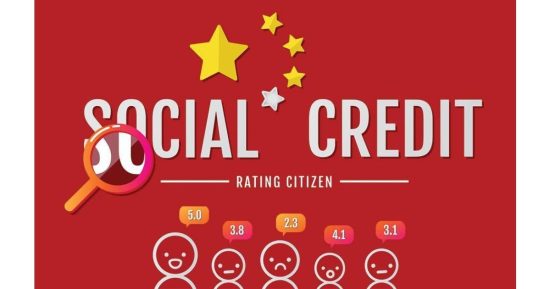The Social Credit System is a federal credit rating and blacklist created by the Chinese government. It is a set of databases and initiatives that monitor and evaluate the social and financial trustworthiness of individuals, businesses, government entities, and NGOs.
The system was introduced in different regions in 2014 and was launched nationally with eight credit scoring firms in 2019.
Citizens are each given social credit scores, with rewards for those with a high rating and punishments for those with low ratings. The database is monitored by China’s economic planner, the People’s Bank of China (PBOC), the National Development and Reform Commission (NDRC), and the country’s court system.
The majority of the data is collected from criminal, financial, corporate, government records, and existing data from registry offices, citizen observers, and credit platforms online.
Also, the Chinese government is sampling collecting data through video surveillance.
How It Really Works

The Chinese government collects and analyses data from various sources and forms social credit scores for individuals and businesses on behalf of each individual, citizen, and company.
Additionally, businesses are sometimes asked to submit information on their partners and suppliers to local and national authorities. Vice versa, suppliers and customers are requested to submit information on companies, like poor behaviour and low trustworthiness.
A good or high rating results in rewards such as free healthcare, easily accessible loans, waiving deposits to renting public housing, and more.
Meanwhile, a poor rating results in punishment and restrictions on the sale of plane tickets, train tickets, education, government approvals, and more.
Government officials with poor ratings are prevented from buying tickets above economy class on flights and trains. They can also be prohibited from stacking up large bills at hotels, nightclubs, and golf courses.
Why Is This System In Place
The concept of developing a nationwide social credit system in China has been discussed for some time, particularly in the financial sector.
The system aims to improve transparency for the public. However, it also serves as a tool for the government to control aspects of people’s lives.
According to Wen Jiabo, “The social credit system provides a good moral guarantee for the reform and development of the socialist economy, politics, culture, and society.”
The Social Credit System Targets
- Honesty In Government Affairs
- Commercial Integrity
- Societal Credibility
- Judicial integrity
The Controversial Nature of China’s Social Credit System
Several arguments have risen since China Social Credit System was initiated. People are concerned about data credibility, data protection, and invasion of privacy in China due to weak regulations and law enforcement.
Also, many wonder if the name-and-shame tactics and embargoes can improve China’s credibility and transparency.
According to Liao Li, “There are many irregularities in the personal credit market; this is not beneficial to the long-term development and trustworthiness of the social credit.”
In 2019, the PBOC endeavored to reduce concerns that the system was becoming too intrusive in people’s lives, saying it had not yet gathered any data concerning utility payments. China’s central bank also mentioned that though the new system could add data concerning water, power, and telecommunication bills, this information would be collected only with the individuals’ permission.
Furthermore, foreign companies in China are concerned with data transfers, including sensitive data, such as technical details, trade secrets, and personnel information.
Please visit us @GoSpeedHub on Facebook, Instagram, and Twitter for more information.
Image Source – api.pinterest.com









